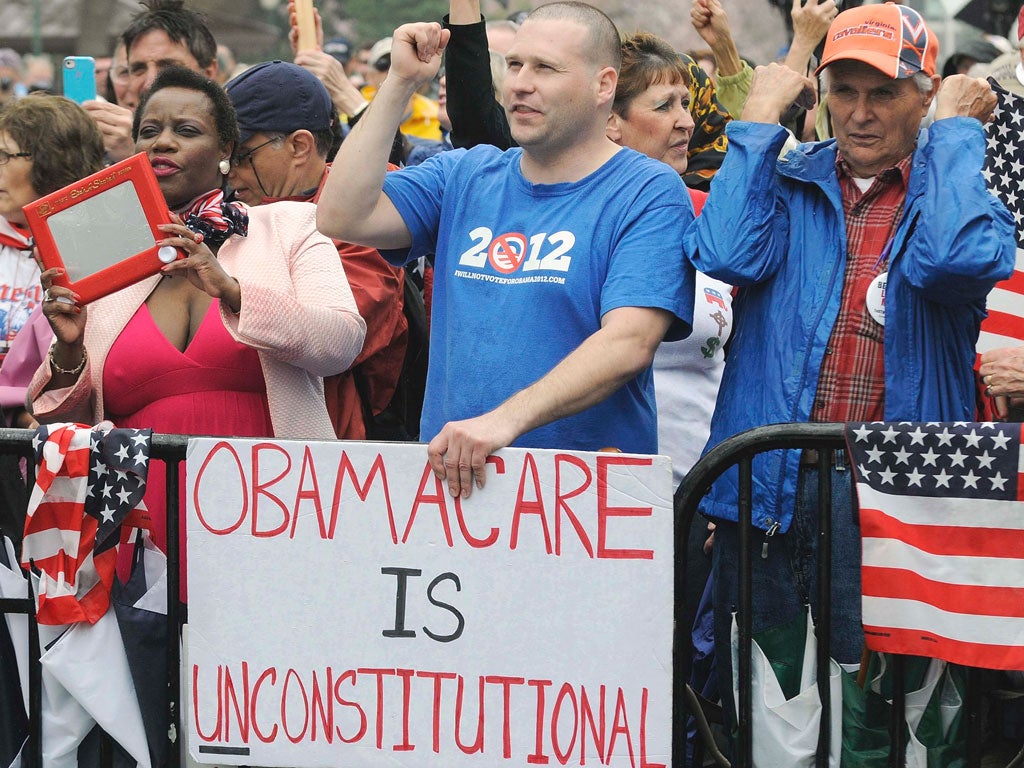
The US Supreme today embarks on three days of momentous hearings into President Obama’s health care reforms that could not only upend the 2012 election campaign but also redraw the limits of Congressional power and the division of authority between federal government and the states.
The oral arguments before the nine justices come two years after the then Democrat-controlled Congress passed Mr Obama’s greatest legislative achievement, without a single Republican vote. Now, after a string of conflicting rulings in lower courts, the country’s highest judicial authority will rule whether ‘Obamacare’ is constitutional – or whether all or part of it should be struck from the statute book.
Despite unprecedented pressure, the court has refused to lift its ban on live television or radio coverage. By Friday evening, queues had already begun for the 200-odd public seats in the colonnaded courtroom where the black-robed justices will question lawyers for the government and the 26 states opposed to the law. A host of demonstrations will take place outside the Court building across the street from the US Capitol.
The hearings will last six hours in all, the longest for any case in almost half a century. Public opinion is split roughly evenly on the law, the biggest overhaul of health care in the US since the 1965 Medicare and Medicaid acts that set up government schemes for the elderly and the poor. For the first time it brings a country where a sixth of the population now lacks health insurance close to universal coverage.
It does so by retaining America’s current system centred on employer-based coverage and operated by for-profit insurance companies. But the latter will henceforth have to provide coverage for all who apply – and in return everyone, healthy or otherwise, left uncovered will be required to buy coverage or face a fine. This so-called ‘individual mandate’ is at the heart of the controversy.
The arguments will be spread over four sessions. This morning will be devoted to what may be termed the ‘cop-out’ option – that because key provisions including the mandate, do not kick in until 2014 and 2015, the court cannot rule upon the act’s legality now. Both friends and foes of Obamacare reject this argument. But the justices could decide otherwise. If so, they would avoid pronouncing on a burning political issue in the midst of the 2012 presidential campaign.
Tomorrow comes the crunch issue, whether the individual mandate is an unconstitutional expansion of central power. The Obama administration says it is essential if reform is to work, but opponents charge that Congress has overstepped its authority. If people are required to buy health insurance, it is argued, what is to stop government telling them what food or car to buy?
On Wednesday morning, the argument shifts to what happens if the individual mandate is struck down – in other words, must the law then be overturned in its entirety? In the afternoon, the justices will take up the argument of 26 Republican-controlled states objecting to Obamacare’s expansion of Medicaid as a violation of states’ rights enshrined in the constitution.
The court will not hand down its ruling until late June, just two months before the party conventions and four months before Election Day. How it will decide is anyone’s guess (though legal experts will be doing precisely that this week, minutely parsing the questions asked by each justice for clues of his or her opinion.)
On purely partisan grounds, the law could be overturned by the court’s five conservative justices, a similar majority to the one that decided the 2000 election in Bush v. Gore. But many analysts suspect Obamacare may in fact survive.
Not since the New Deal has the Supreme Court rejected a central piece of socio-economic legislation enacted by Congress, they point out. Nor will a Court anxious to restore its image as impartial arbiter want to be siding so obviously with the Republican White House candidates, all of whom vow to repeal Obamacare if elected.
Subscribe to Independent Premium to bookmark this article
Want to bookmark your favourite articles and stories to read or reference later? Start your Independent Premium subscription today.

Join our commenting forum
Join thought-provoking conversations, follow other Independent readers and see their replies